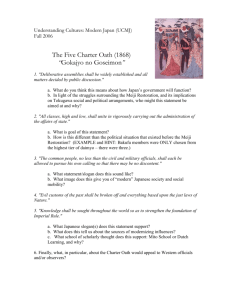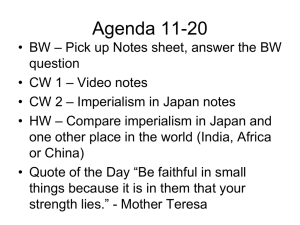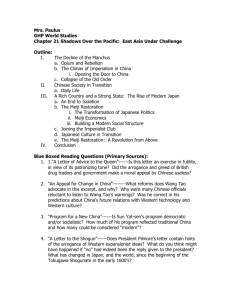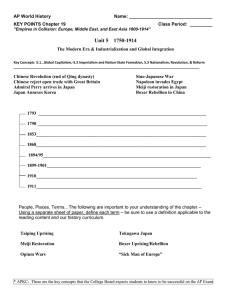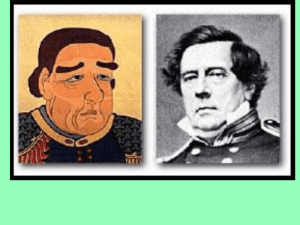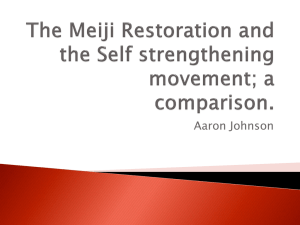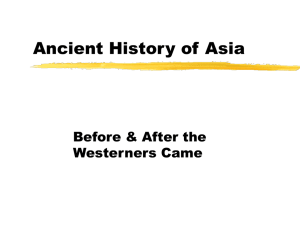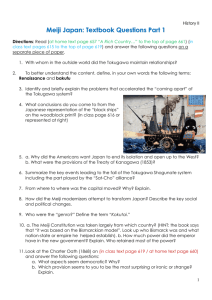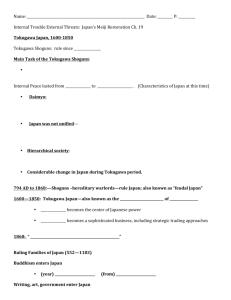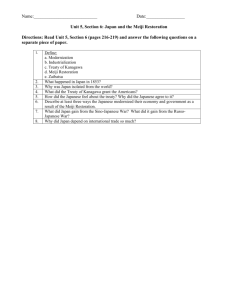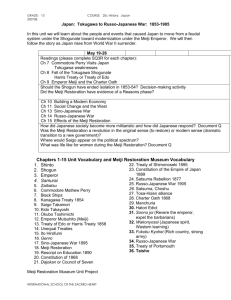Global History & Geography 10 Name: Imperialism Date: Ms. Seim
advertisement
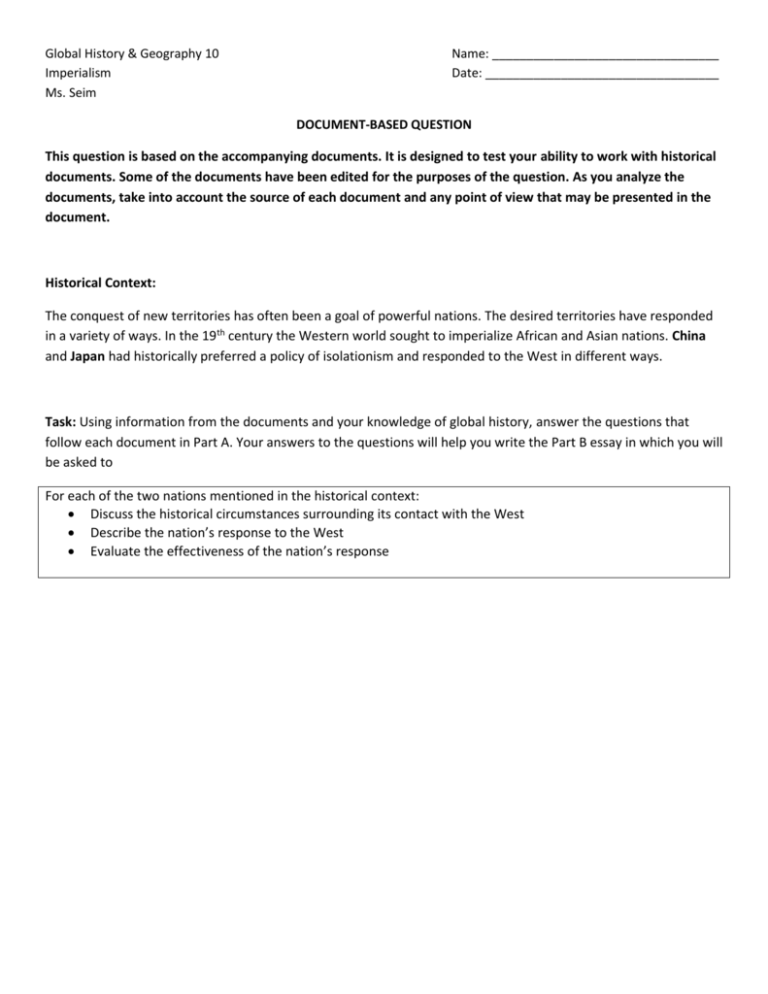
Global History & Geography 10 Imperialism Ms. Seim Name: _________________________________ Date: __________________________________ DOCUMENT-BASED QUESTION This question is based on the accompanying documents. It is designed to test your ability to work with historical documents. Some of the documents have been edited for the purposes of the question. As you analyze the documents, take into account the source of each document and any point of view that may be presented in the document. Historical Context: The conquest of new territories has often been a goal of powerful nations. The desired territories have responded in a variety of ways. In the 19th century the Western world sought to imperialize African and Asian nations. China and Japan had historically preferred a policy of isolationism and responded to the West in different ways. Task: Using information from the documents and your knowledge of global history, answer the questions that follow each document in Part A. Your answers to the questions will help you write the Part B essay in which you will be asked to For each of the two nations mentioned in the historical context: Discuss the historical circumstances surrounding its contact with the West Describe the nation’s response to the West Evaluate the effectiveness of the nation’s response Document 1 “Hitherto, all European nations, including your own country's barbarian merchants, have carried on trade with our Celestial Empire at Canton. Such has been the procedure for many centuries, although our Celestial Empire possesses all things in prolific abundance and lacks no product within its own borders. There is, therefore, no need to import any of the manufactures of outside barbarians in exchange for our own products.” Source– Letter from Ch'ien Lung to George III, dated 1793 1. What is the main idea of Ch’ien Lung’s letter? Document 2A Document 2B 2. According to the map in document 6A and the political cartoon in document 6B, how was China affected by imperialism in the late 1800’s and early 1900’s? Document 3 “…But after a long period of commercial intercourse [trade], there appear among the crowd of barbarians both good persons and bad, unevenly. Consequently there are those who smuggle opium to seduce the Chinese people and so cause the spread of the poison to all provinces. Such persons who only care to profit themselves, and disregard their harm to others, are not tolerated by the laws of heaven and are unanimously hated by human beings. His Majesty the Emperor, upon hearing of this, is in a towering rage. He has especially sent me, his commissioner, to come to Kwangtung [Guangdong Province], and together with the governor-general and governor jointly to investigate and settle this matter….” Source “Letter of Advice to Queen Victoria” from Lin Zexu (Lin Tse-Hsü), Chinese Commissioner of Canton, 1839 3. What is the main idea of Lin Zexu’s letter? Document 4 For the most part the four hundred million people of China can be spoken of as completely Han Chinese. With common customs and habits, we are completely of one race. But in the world today what position do we occupy? Compared to the other peoples of the world we have the greatest population and our civilization is four thousand years old; we should therefore be advancing in the front rank with the nations of Europe and America. But the Chinese people have only family and clan solidarity; they do not have national spirit. Therefore even though we have four hundred million people gathered together in one China, in reality they are just a heap of loose sand. Today we are the poorest and weakest nation in the world, and occupy the lowest position in international affairs. Other men are the carving knife and serving dish; we are the fish and the meat. Our position at this time is most perilous. If we do not earnestly espouse nationalism and weld together our four hundred million people into a strong nation, there is danger of China's being lost and our people being destroyed. If we wish to avert this catastrophe, we must espouse nationalism and bring this national spirit to the salvation of the country. Source: The Three People's Principles by Sun Yat–sen 4. According to Sun-Yat-sen, what is a great issue for China? Document 5 5. According to the diagram, state two characterisitics of Japanese society prior to the Meiji restoration. Document 6 6. Using the picture above, state one characteristic of the ships commanded by Matthew Perry to deliver President Filmour’s message to the shogun. Document 7 . . .The [Meiji] Restoration found Japan [1868–1912] practically an agricultural country, purely and simply. There were few, if any, industries of importance. The agriculturists [farmers] produced sufficient food to supply the nation, and Japan was in every sense self-supporting. Even the taxes were paid in rice, and farmers were ranked far higher than merchants. History showed the Japanese, however, that it is very difficult to maintain a high standard of national greatness when the revenue of the land and the prosperity of the people depends absolutely upon the fall of rain or the hours of sunshine. . . . Besides the necessity, there was an additional reason to be found in the knowledge that industrial growth would add enormously to the power of the nation, not only in the Far East, but among European countries. It was recognized that industrial and commercial development was a much surer guarantee of greatness than military power, and that the conquest of markets was more efficacious [effective] than the destruction of armies and navies. In this proficiency Japan desired to be the England of the East . . . . Source: Alfred Stead, Great Japan: A Study of National Efficiency, John Lane Company 7A. Identify one feature of Japanese economic life before the Meiji Restoration. 7B. Identify one way in which the Meiji Restoration changed economic life in Japan. Document 8 4. Based on the information provided by this map, state one reason Japan would want to acquire Korea and Manchuria. Part B Historical Context: The conquest of new territories has often been a goal of powerful nations. The desired territories have responded in a variety of ways. In the 19th century the Western world sought to imperialize African and Asian nations. China and Japan had historically preferred a policy of isolationism and responded to the West in different ways. Task: Using information from the documents and your knowledge of global history, write a well-developed, organized essay in which you address the task below. For each of the two nations mentioned in the historical context: Discuss the historical circumstances surrounding its contact with the West Describe the nation’s response to the West Evaluate the effectiveness of the nation’s response
